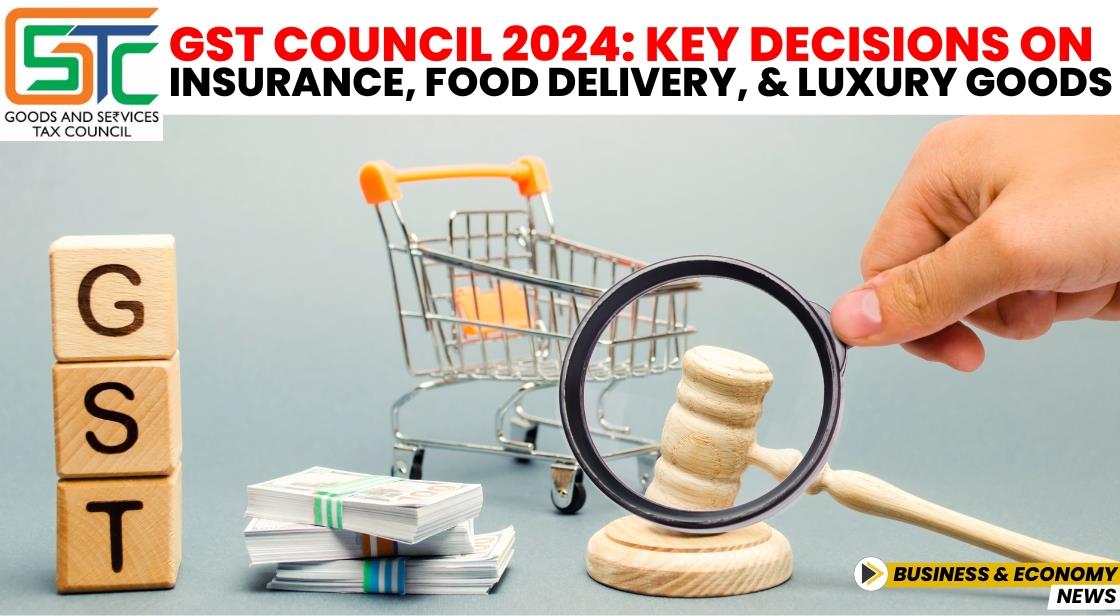GST Council 2024: Key Decisions on Insurance, Food Delivery, and Luxury Goods

News Synopsis
The 55th meeting of the Goods and Services Tax (GST) Council is set to take place on December 21, 2024, on a Saturday. The meeting will focus on reviewing various proposed adjustments to GST rates across sectors, which could affect a wide array of products and services. Among the key areas under discussion are insurance premiums, aviation turbine fuel (ATF), luxury goods, and food delivery services.
GST on Insurance Premiums: What’s Changing?
One of the most awaited discussions in the GST Council meeting is the proposal to revise the GST rates on insurance premiums. The Government has been contemplating reducing the tax burden on life and health insurance premiums for some time. The proposal to cut GST on premiums for these types of insurance policies is expected to take center stage in the meeting.
Currently, life insurance, health insurance, and unit-linked insurance policies are taxed at 18% GST. However, there is a strong likelihood of changes, particularly for senior citizens and individuals opting for health insurance coverage of Rs 5 lakh or more.
According to official sources, “The Group of Ministers has recommended exempting these categories from GST,” aiming to provide more affordable coverage for vulnerable sections of society. Meanwhile, other insurance policies might maintain the current GST rate.
The Insurance Regulatory and Development Authority of India (IRDAI) has voiced support for these changes, highlighting that many developed countries, including the European Union and Canada, do not impose VAT or GST on insurance premiums.
The IRDAI has argued that offering GST exemptions for senior citizens and micro-insurance products could stimulate wider adoption of insurance and enhance the accessibility of health coverage, particularly for marginalized communities.
Possible Relief for Everyday Goods: Food Delivery, Bicycles, and More
In a bid to ease the financial burden on the public, the GST Council may propose lowering tax rates for several essential goods and services, including food delivery services, bicycles, and packaged drinking water. If approved, this move will make everyday essentials more affordable for the average consumer. With more people turning to food delivery apps and sustainable transport options like bicycles, such a tax revision would provide immediate relief.
Aviation Turbine Fuel (ATF) and Airline Taxation
Another significant proposal under discussion is the inclusion of aviation turbine fuel (ATF) under the GST regime. ATF, which currently attracts state-specific taxes, could be brought under a uniform taxation system, helping to streamline processes for the aviation industry.
Airlines would also be able to avail of input tax credit (ITC) on ATF purchases, which has been a long-standing demand of the sector. This move would benefit both airlines and passengers by reducing operational costs and keeping ticket prices stable.
Luxury Goods: Higher Taxes on Premium Products
The GST Council is also expected to deliberate on increasing the tax rates for high-end goods, such as luxury wristwatches, designer shoes, and expensive readymade garments. This would align with the introduction of pricing-based tax differentiation that has been part of the indirect tax regime for the last seven years.
Higher taxes on luxury products could potentially help increase government revenue while discouraging excessive consumption of non-essential goods.
A Possible GST Hike on Pre-owned EVs and Compact Vehicles
The Council will also review the possibility of increasing GST on certain goods, including pre-owned electric vehicles (EVs) and compact petrol and diesel vehicles. The proposal suggests increasing the GST rate from 12% to 18% for these items, impacting both the second-hand vehicle market and the transition to electric mobility.
Conclusion: Anticipating the Impact of GST Council’s Decisions
The outcomes of the 55th GST Council meeting scheduled for December 21, 2024, will be critical for various sectors, from insurance to aviation, and could significantly alter the price landscape for consumers across India. If the proposals to reduce GST on essential goods and insurance premiums are approved, it will alleviate the financial pressure on many individuals, especially seniors and low-income households.
However, the potential hike in GST on luxury goods and vehicles could impact the affluent segment of society, pushing up the costs of non-essential purchases. Stay tuned for more updates as the GST Council finalizes its decisions.
You May Like









